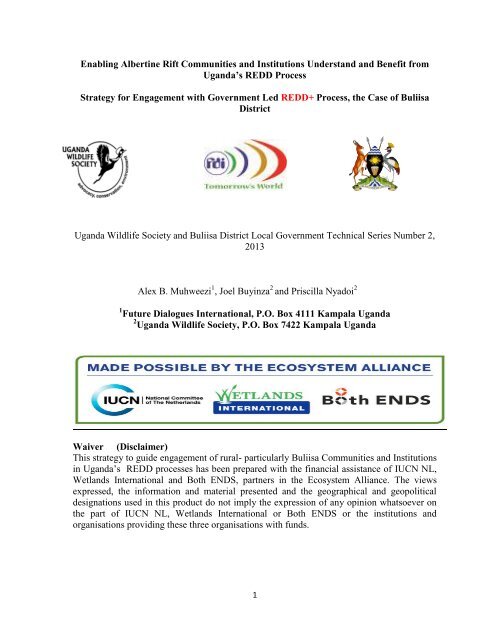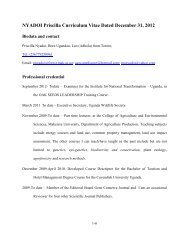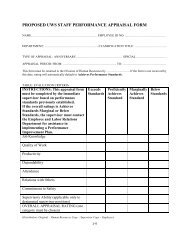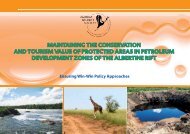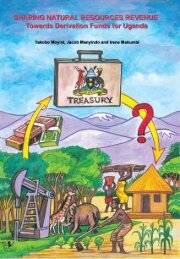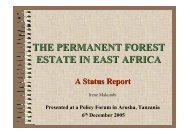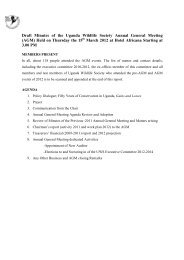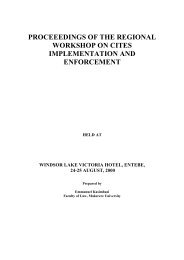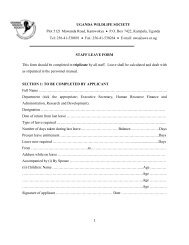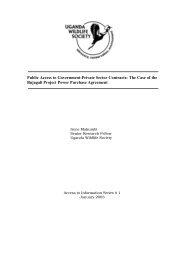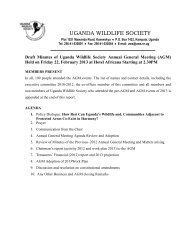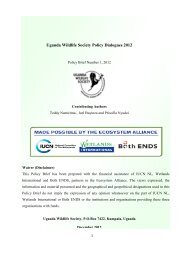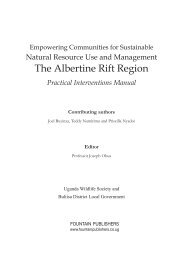Download Here - Uganda Wildlife Society
Download Here - Uganda Wildlife Society
Download Here - Uganda Wildlife Society
You also want an ePaper? Increase the reach of your titles
YUMPU automatically turns print PDFs into web optimized ePapers that Google loves.
Enabling Albertine Rift Communities and Institutions Understand and Benefit from<br />
<strong>Uganda</strong>’s REDD Process<br />
Strategy for Engagement with Government Led REDD+ Process, the Case of Buliisa<br />
District<br />
<strong>Uganda</strong> <strong>Wildlife</strong> <strong>Society</strong> and Buliisa District Local Government Technical Series Number 2,<br />
2013<br />
Alex B. Muhweezi 1 , Joel Buyinza 2 and Priscilla Nyadoi 2<br />
1 Future Dialogues International, P.O. Box 4111 Kampala <strong>Uganda</strong><br />
2 <strong>Uganda</strong> <strong>Wildlife</strong> <strong>Society</strong>, P.O. Box 7422 Kampala <strong>Uganda</strong><br />
Waiver (Disclaimer)<br />
This strategy to guide engagement of rural- particularly Buliisa Communities and Institutions<br />
in <strong>Uganda</strong>‟s REDD processes has been prepared with the financial assistance of IUCN NL,<br />
Wetlands International and Both ENDS, partners in the Ecosystem Alliance. The views<br />
expressed, the information and material presented and the geographical and geopolitical<br />
designations used in this product do not imply the expression of any opinion whatsoever on<br />
the part of IUCN NL, Wetlands International or Both ENDS or the institutions and<br />
organisations providing these three organisations with funds.<br />
1
SUMMARY<br />
This strategy prepared to guide Albertine Rift and in particular Buliisa Communities and<br />
Institutions engagement in the <strong>Uganda</strong> National REDD (Reducing Emissions from<br />
Deforestation and Forest Degradation) Process was developed after wide consultation with<br />
and analysis of the capacity and needs of local communities (through their representatives)<br />
and institutions in Buliisa District. The capacity assessment and need assessment was<br />
conducted during two day workshop <strong>Uganda</strong> <strong>Wildlife</strong> <strong>Society</strong> and Buliisa District Local<br />
Government held with the stated stakeholders in the district. The strategy is in particular<br />
applicable to the Buliisa District Communities (including five civil society organizations, 25<br />
individuals representing the fisher folk, pastoralists, crop farmers, wildlife resource<br />
dependent and oil affected or dependent households) and natural resource management<br />
institutions officials (Fisheries, forestry, wildlife, agriculture, livestock, water and minerals)<br />
representatives. The Authors envisage this strategy will guide the <strong>Uganda</strong> National REDD<br />
Focal persons and institutions know how to and engage the Buliisa District Rural<br />
Communities and relevant institutions in the country‟s on-going and future REDD processes,<br />
including, awareness, policy formulations, benefits and participation components.<br />
2
Introduction<br />
Developed by <strong>Uganda</strong> <strong>Wildlife</strong> <strong>Society</strong> and Buliisa District Local Government after needs and<br />
capacity assessment of relevant stakeholders in a two days‟ workshop, this strategy is a<br />
description of actions and modalities that were identified as would be strategic choices and<br />
actions that would help guide Buliisa communities and institutions‟ engagement in the National<br />
REDD+ processes effectively. This strategy need to be applied alongside the REDD+ Training<br />
technical manual-<strong>Uganda</strong> <strong>Wildlife</strong> <strong>Society</strong> and Buliisa District Local Government Technical<br />
Series Number 2, 2013 (Muhweezi et al., 2013). Before proposed choices and actions<br />
suggestion, the <strong>Uganda</strong> National REDD processes are highlighted here below.<br />
<strong>Uganda</strong> Government led REDD+ process<br />
The Government led REDD+ process in <strong>Uganda</strong> is designed to be achieved through four phases<br />
as shown below:<br />
Qualifying for Readiness Phase Strategy Phase<br />
Carbon Phase<br />
C<br />
REDD Project<br />
Identification<br />
Note (R-PIN)<br />
Preparation and finalization<br />
of R-PP (Consultations,<br />
Studies and Assessments,<br />
Proposal documentation, R-<br />
PP Reviews and Approvals,<br />
securing financing<br />
commitments, mobilizing to<br />
start implementation).<br />
Adapted from: <strong>Uganda</strong>’s R-PP (May 2012)<br />
Implementation of R-PP<br />
resulting into REDD -Plus<br />
Strategy and Preparedness for<br />
<strong>Uganda</strong> (Capacity building,<br />
Development of REDD+ Strategy<br />
Options, Development of<br />
implementation and<br />
monitoring systems, Piloting<br />
activities, Completing<br />
information database and<br />
assessment, etc.).<br />
By May 2013, the national REDD+ process was preparing to embark on the third phase (Strategy<br />
Phase) of the REDD+ process. During this phase, the country will prepare a national REDD+<br />
Readiness Strategy, through carrying out the following activities; among others.<br />
Carbon<br />
Market<br />
a. Assessing potential strategic options proposed in the Readiness Phase and identifying<br />
needs for additional information required to inform the design of the REDD+ Readiness<br />
3
strategy, including proposals for early implementation of pilot or demonstration<br />
activities, where applicable.<br />
b. Research on the identified information gaps that may include the following among others:<br />
updating the inventory data on status of forests and forestry resources (biomass inventory<br />
and biodiversity values), reviewing ongoing community approaches and analyzing their<br />
suitability for fund channeling arrangements for REDD+, reviewing Collaborative<br />
Resources Management (CRM)/Collaborative Forestry Management (CFM) approaches<br />
to improve effectiveness, efficiency and community empowerment and, reviewing policy,<br />
legal and institutional arrangements in relation to REDD+ issues and needs.<br />
c. Facilitating early implementation of pilot strategies such as: selecting strategies and<br />
activities for piloting and testing, identifying Social and Environmental issues pertaining<br />
to the Pilot activities and recommending them for SESA, developing mechanisms for<br />
coordinating and managing the proposed activities to ensure appropriate accounting,<br />
oversight, and transparency in the implementation of these activities.<br />
d. Evaluating and monitoring outcomes of early implementation activities.<br />
e. Evaluating the outcomes and lessons learned.<br />
f. Carrying out socio-economic analysis of the proposed REDD+ strategies to determine<br />
cost, effectiveness and relevance on a national scale.<br />
g. Undertaking a “Risk Assessment and Management process” and developing mitigation<br />
measures as appropriate.<br />
h. Developing and finalizing the National REDD+ Strategy, based on those strategies that<br />
are deemed suitable for inclusion in the national strategy.<br />
Providing synergy to the Government Led REDD Process<br />
<strong>Uganda</strong> <strong>Wildlife</strong> <strong>Society</strong> and Buliisa District Local Government work on REDD at the district<br />
aimed at the following: Ensuring five Civil <strong>Society</strong> Organizations (CSOs) who will later work as<br />
change agents among Communities in Buliisa district become knowledgeable about REDD+ and<br />
able to actively promote REDD+ among communities (farmers, wildlife resource dependent<br />
households, forest resource dependent households, fisheries resource dependent households and<br />
pastoralists) in the District. To generate and disseminate information on potential opportunities,<br />
risks and benefits of implementing <strong>Uganda</strong>'s REDD+ strategies by communities and institutions<br />
4
in Buliisa District. The <strong>Society</strong> and District held the required training for the stakeholder and<br />
moved ahead to evaluate their needs and capacity for engagement in the National REDD process.<br />
Based on findings of the needs/capacity assessments, the society and district developed this<br />
strategy to enable and guide participation of Buliisa district communities and institutions in the<br />
National REDD process.<br />
Objectives of the Strategy Engagement Strategy for Buliisa Communities and Institutions<br />
Objectives of this REDD process Engagement Strategy is four fold:<br />
a) To link Buliisa based REDD+ interventions to the national REDD+ process.<br />
b) To guide participation of Buliisa communities and institutions and, UWS in the national<br />
REDD+ process.<br />
c) For UWS to learn and share REDD+ lessons and experience in Buliisa with other REDD+<br />
players at national levels and within other parts of the country.<br />
d) To position UWS as an active national level partner on REDD+ process in the country.<br />
To realize these objectives, the UWS and Buliisa District conducted needs and capacity<br />
assessments of the targeted stakeholders, in order to identify strategies for their engagement in<br />
the National REDD Processes. The table below gives issues for which assessments were done.<br />
Table: Needs and Capacity for Engagement in the National REDD Process by Buliisa<br />
Communities and Institutions<br />
Intervention areas Output Activities Lead/partner<br />
Field level<br />
Assessing potential strategic<br />
options … for addressing<br />
Deforestation and forest<br />
degradation in Buliisa.<br />
Inventory data on status of<br />
forests and forestry<br />
resources (biomass<br />
inventory and biodiversity<br />
values) in Buliisa.<br />
Reviewing Collaborative<br />
Resources Management<br />
(CRM)/Collaborative<br />
Forestry Management<br />
(CFM) approaches to<br />
improve effectiveness,<br />
efficiency and community<br />
<br />
<br />
<br />
<br />
Information on drivers of<br />
deforestation and forest<br />
degradation in Buliisa.<br />
Strategies for addressing<br />
deforestation and forest<br />
degradation in Buliisa.<br />
Information on status of<br />
forestry resources and<br />
forestry biodiversity in<br />
Buliisa<br />
Information on ongoing<br />
community approaches<br />
e.g., CFM around<br />
Budongo Forest, CRM<br />
around <strong>Wildlife</strong> Reserves,<br />
BMU<br />
(Fisheries)…focusing on<br />
<br />
<br />
<br />
<br />
<br />
<br />
<br />
<br />
<br />
<br />
Develop TORs for the assessment.<br />
Undertake rapid field assessment<br />
of key drivers<br />
Consult with stakeholders and<br />
define drivers.<br />
Consult stakeholders on potential<br />
strategies for addressing the<br />
drivers.<br />
Develop TORs for the inventory<br />
and mapping.<br />
Commission forest inventory and<br />
mapping<br />
Commission rapid ecological and<br />
social -economic survey about<br />
forest resources in Buliisa.<br />
Develop TORs for the assessment.<br />
Commission the assessment.<br />
Convene stakeholder meeting to<br />
validate findings of the assessment.<br />
UWS<br />
Consultants?<br />
UWS<br />
NFA (Biomass<br />
Unit)<br />
Consultants?<br />
UWS<br />
Consultants<br />
5
empowerment in Bulisa. their experiences and<br />
lessons as community<br />
platforms for participation<br />
in NRM<br />
Reviewing policy, legal and<br />
institutional arrangements in<br />
relation to REDD+ issues<br />
and implementation needs<br />
in Buliisa.<br />
Pilot REDD+ activities in<br />
Buliisa.<br />
Develop tools for<br />
facilitating stakeholder<br />
engagement in REDD+<br />
National Level<br />
Participate in national level<br />
REDD+ processes<br />
Information of policy,<br />
legal and institutional<br />
frame works and<br />
arrangements for REDD+<br />
implementation in Buliisa.<br />
REDD+ field<br />
demonstration activities.<br />
Tools for facilitating<br />
stakeholders<br />
<br />
<br />
<br />
UWS inputs into technical<br />
aspects.<br />
Lesson and experiences<br />
from REDD+ in Buliisa<br />
feeding into national<br />
processes<br />
<br />
<br />
<br />
Develop TORs for the assessment.<br />
Commission the assessment.<br />
Convene stakeholder meeting to<br />
validate findings of the assessment.<br />
Identify/assess, select and describe<br />
sites.<br />
Process authorization from<br />
National REDD+ Focal Point.<br />
Facilitate establishment of field<br />
demonstration activities<br />
Facilitate learning (exchange visit).<br />
Develop:<br />
i. Stakeholder Consultations and<br />
Participation strategy<br />
ii. Communications and outreach<br />
Strategy<br />
iii. Grievances and conflicts<br />
management strategy.<br />
iv. Strategy for assessing likely<br />
social and environmental<br />
impacts of REDD+.<br />
Convene Stakeholder meetings to<br />
review and validate the Strategies.<br />
<br />
<br />
<br />
<br />
<br />
<br />
Lobby National REDD+ Focal<br />
Point for UWS recognition and<br />
participation in REDD+ process.<br />
Participation in forums convened<br />
by national REDD+ Focal Point.<br />
Provide input into technical aspects<br />
(studies, assessments, strategy<br />
development, etc.).<br />
Lobby National Focal Point for<br />
„space” for Buliisa CSO<br />
participation.<br />
Facilitate CSO participation.<br />
Document and share experiences<br />
and lessons from Buliisa REDD+<br />
activities with National REDD+<br />
processes.<br />
UWS<br />
Consultants<br />
UWS<br />
REDD+ National<br />
Focal Point<br />
UWS<br />
Consultants<br />
UWS Secretariat<br />
UWS Secretariat<br />
CSO in Buliisa<br />
Strategy implementation arrangements<br />
<strong>Uganda</strong> <strong>Wildlife</strong> <strong>Society</strong><br />
The UWS Secretariat will assume leadership on all aspects of implementing this Strategy.<br />
Relevant technical and coordination responsibilities will be delegated to the UWS Field Office in<br />
Buliisa. The Main responsibilities for UWS Secretariat will be:<br />
a. Mobilize financial and technical resources to implement the Strategy.<br />
6
. Mobilize policy level recognition (National REDD+ Focal Point) of UWS participation<br />
and contribution at national and field level (Buliisa).<br />
c. Participate in national level REDD+ processes.<br />
d. Establish and foster partnerships with other REDD+ players at national and other levels.<br />
e. Document and share REDD+ lessons and experiences.<br />
f. Facilitate training and capacity building for Buliisa based CSOs and other players in<br />
REDD+.<br />
g. Commission REDD+ assessments, reviews of drivers, forest resources (Inventories and<br />
mapping).<br />
h. Facilitate development of tools for stakeholder engagement in REDD+ in Buliisa.<br />
i. Convene and facilitate Stakeholders platforms on REDD+ in Buliisa.<br />
j. Facilitate establishment of REDD+ demonstration activities.<br />
7
Change Agents<br />
<strong>Uganda</strong> <strong>Wildlife</strong> <strong>Society</strong> has conducted initial training and will continue to train REDD+ Change<br />
Agents and other players in Buliisa. Change agents will be tasked to:<br />
a. Communicate and raise awareness on REDD+ among their communities.<br />
b. Participate in REDD+ forums at local, district and national levels, as appropriate.<br />
c. Participate in undertaking reviews and assessment on REDD+ issues in the district.<br />
d. Participate and provide information in lessons learning and documentation processes.<br />
Mandated institutions<br />
The following are mandated institutions in the environment and natural resources sector: NFA,<br />
District Forest Support Department, District Environment Office, District Fisheries Office, UWA<br />
Field Offices, etc. <strong>Uganda</strong> <strong>Wildlife</strong> <strong>Society</strong> will spearhead mobilization of the mandated<br />
institutions in Buliisa at the National level, to participate in and provide technical support to the<br />
REDD+ process activities in Buliisa and for Buliisa communities and institutions at the national<br />
level processes.<br />
Strategy implementation requirements<br />
Table: Resources required for the implementation of the REDD strategy<br />
UWS Secretariat<br />
a. Financial and technical resources.<br />
b. Manpower.<br />
c. Information about REDD+<br />
d. Information about Forestry issues in Buliisa<br />
Change Agents<br />
a. Capacity/Skills<br />
b. Tools for implementing REDD+<br />
c. Communication and awareness messages and materials<br />
8


